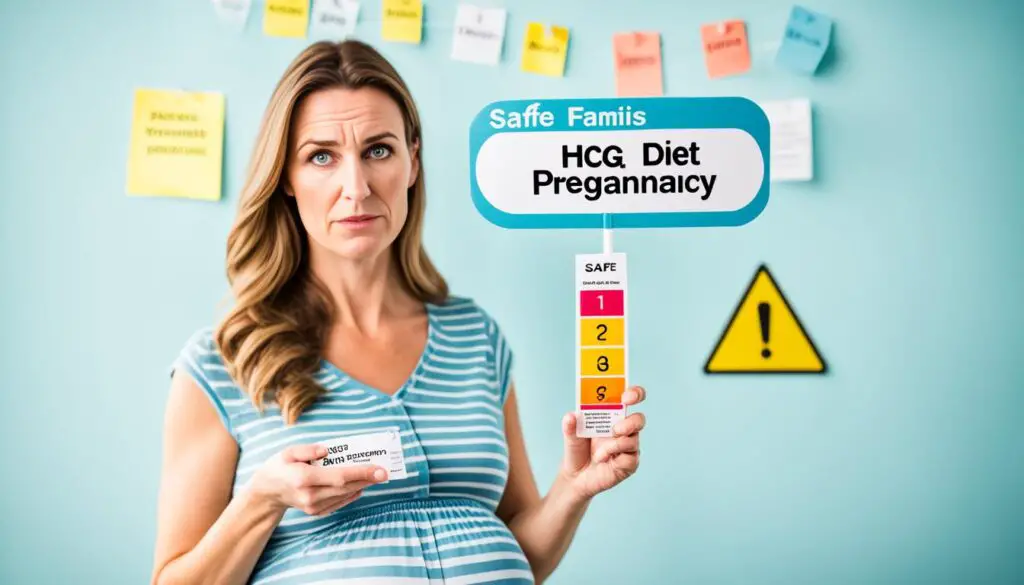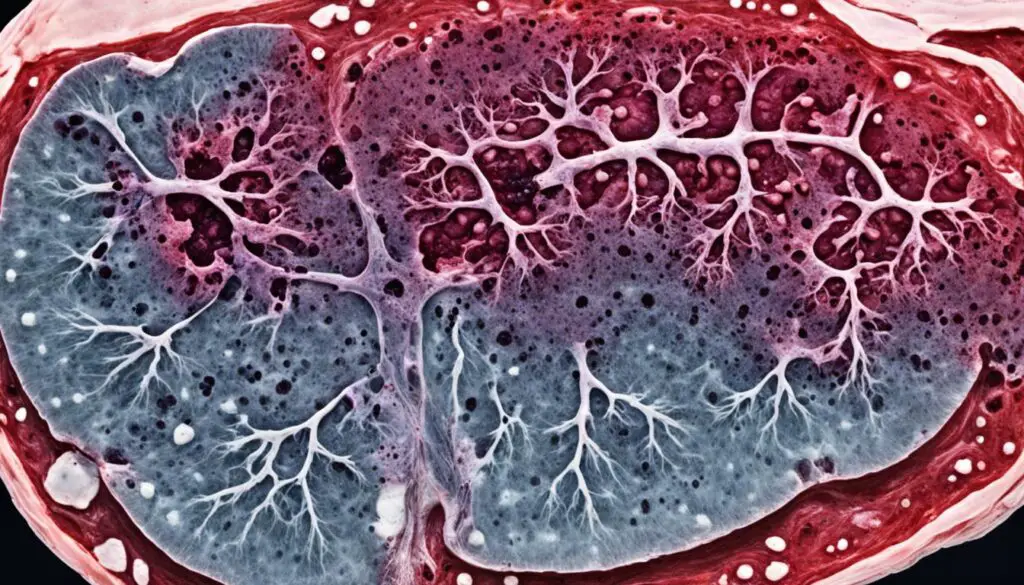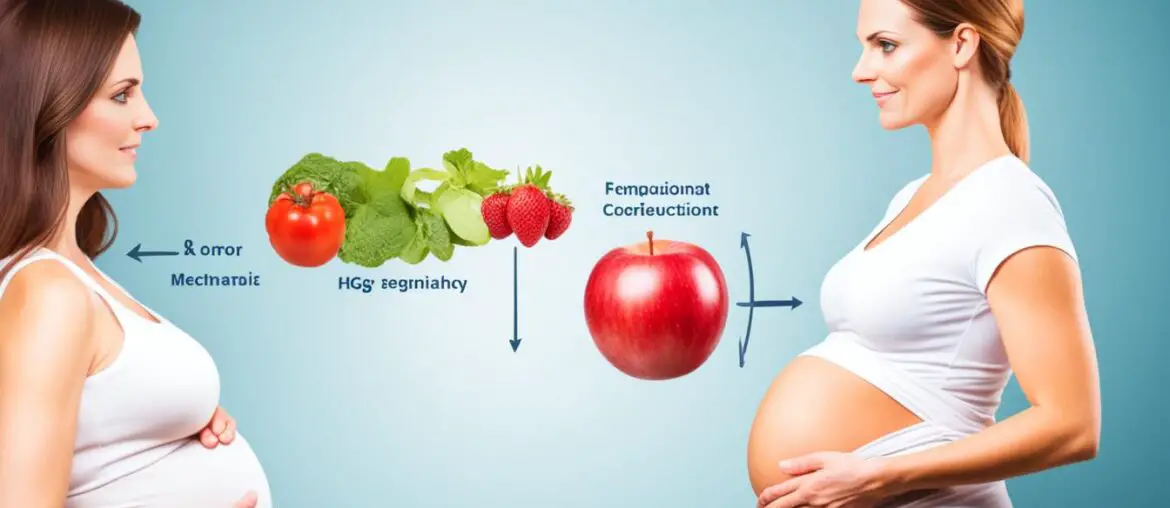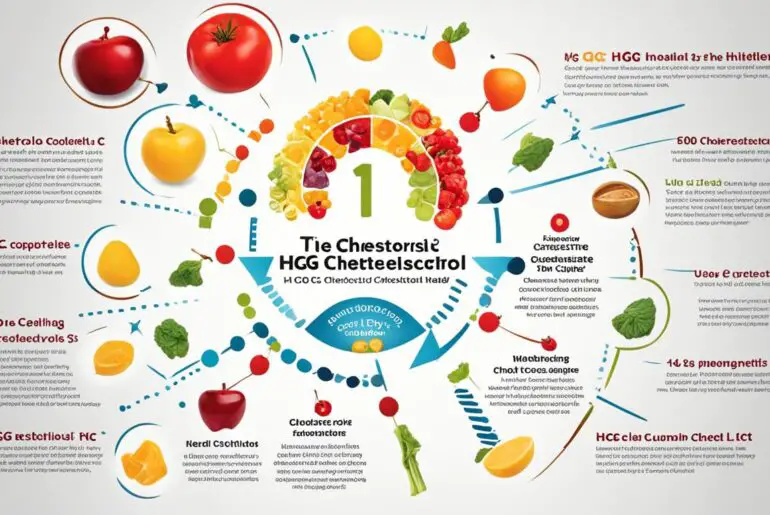Have you ever heard of using pregnancy hormones to help with weight loss? It may sound like an unconventional approach, but the HCG diet has gained popularity for its claims of utilizing the pregnancy hormone, human chorionic gonadotropin (HCG), to shed those extra pounds. But is this diet really as effective and safe as it claims to be?
In this article, we will delve into the controversial world of the HCG diet and explore the potential link between HCG and weight loss. We will uncover the truths, debunk the myths, and shed light on the safety concerns surrounding this diet trend. So, sit back, relax, and let’s dive deep into the intriguing world of the HCG diet.
Key Takeaways:
- The HCG diet claims to use the pregnancy hormone, HCG, to aid in weight loss.
- The FDA advises against using HCG for weight loss, as it is not approved for this purpose.
- Severe calorie restriction is a central component of the HCG diet, with daily calorie intake ranging from 500 to 800 calories.
- The HCG diet carries potential safety risks, including gallstone formation, irregular heartbeat, and nutrient deficiencies.
- It is important to consult with a healthcare professional for safe and sustainable weight loss strategies.
How the HCG Diet Works
The HCG diet is a weight loss plan that involves severe calorie restriction and the use of the pregnancy hormone, HCG. Advocates of the diet claim that HCG can reset metabolism, leading to rapid weight loss without feeling hungry or weak.
During the HCG diet, individuals are required to limit their daily calorie intake to only 500-800 calories. This extremely low-calorie approach typically involves consuming two meals per day, each consisting of a protein source, vegetable, bread, and fruit. However, certain foods, such as fatty fish, are restricted.
It’s important to note that the use of HCG for weight loss is not approved by the FDA, and over-the-counter HCG products are considered illegal. While proponents of the diet emphasize the hormone’s supposed metabolic benefits, scientific evidence does not support these claims. Any very-low-calorie diet is likely to result in weight loss, regardless of the presence of HCG.
“Advocates of the HCG diet claim that it can reset metabolism, leading to rapid weight loss without feeling hungry or weak.”
The HCG diet may lead to initial weight loss due to severe calorie restriction, but its long-term sustainability and health effects are questionable. Moreover, the FDA warns against the use of HCG for weight loss and urges individuals to consult healthcare professionals for safe and effective weight loss strategies.
Pros and Cons of the HCG Diet
| Pros | Cons |
|---|---|
|
|
It is crucial to approach weight loss strategies with caution and prioritize long-term health and sustainability. Consulting with a healthcare professional can provide personalized guidance and help individuals make informed decisions about their weight loss journey.
Safety Concerns of the HCG Diet

The HCG diet is not without its safety concerns and potential side effects. It is essential to be aware of these risks before considering this weight loss method. Reported side effects of the HCG diet include fatigue, irritability, restlessness, depression, fluid buildup, and swelling of the breasts in males. These side effects can significantly impact an individual’s well-being and quality of life during the diet.
A serious concern related to the HCG diet is the risk of blood clots forming and blocking blood vessels, a condition known as thromboembolism. Blood clots can have severe consequences and may require immediate medical attention. Individuals considering the HCG diet should be aware of this potential risk, especially if they have a history of blood clotting disorders or other conditions that increase their susceptibility.
Another safety concern associated with the HCG diet is the risk of gallstone formation. Severe calorie restriction, such as that required by the HCG diet, can lead to the development of gallstones. Gallstones are hard deposits that form in the gallbladder and can cause intense pain and other complications. It is vital to be cautious and monitor for any symptoms of gallstones while on the HCG diet.
Furthermore, the HCG diet’s severe calorie restriction can result in nutrient deficiencies and electrolyte imbalances. When the body does not receive adequate nutrients, it can lead to a range of health issues, including weakness, dizziness, and compromised immune function. It is crucial to ensure that any weight loss method prioritizes proper nutrition and the overall well-being of an individual.
To achieve safe and sustainable weight loss, it is recommended to follow a balanced, calorie-controlled diet that meets the individual’s specific nutritional needs. In addition, regular exercise should be incorporated into the weight loss plan to promote overall health and well-being. Consulting with a healthcare professional before embarking on any weight loss program is essential to ensure personal safety and mitigate potential risks.
References:
- “HCG Diet: Is It Safe and Effective?” Mayo Clinic, https://www.mayoclinic.org/healthy-lifestyle/weight-loss/expert-answers/hcg-diet/faq-20058164
- Centers for Disease Control and Prevention. “Hormonal Contraception and Blood Clot Risk.” https://www.cdc.gov/ncbddd/spanish/bloodclots/
- U.S. Food and Drug Administration. “Public Notification: HCG Weight Loss Products Are Illegal.” https://www.fda.gov/drugs/medication-health-fraud/public-notification-hcg-weight-loss-products-are-illegal
Effectiveness of the HCG Diet
The HCG diet, often touted as a solution for weight loss, lacks scientific evidence to support its effectiveness. The FDA has issued warnings against over-the-counter HCG products, stating that they are not proven to be effective for weight loss. While the diet’s severe calorie restriction may result in initial weight loss, the long-term sustainability and health effects of such a low-calorie regimen are questionable.
Research is inconclusive regarding the HCG diet’s ability to promote sustainable weight loss. It is important to recognize that weight loss is influenced by various factors, including individual metabolism, genetics, and overall lifestyle. Relying solely on the HCG diet for weight loss may not deliver the desired results.
Instead of resorting to unproven methods, individuals seeking to lose weight should focus on evidence-based approaches supported by research and approved by healthcare professionals. Sustainable weight loss strategies typically involve a balanced diet, regular physical activity, behavior modification, and support from qualified professionals.
Consulting with a healthcare provider or registered dietitian can help determine personalized weight loss goals and develop a plan that suits individual needs. They can guide individuals toward effective, safe, and sustainable weight loss methods that prioritize overall health and well-being.
“The HCG diet lacks scientific evidence to support its effectiveness for sustained weight loss.”
– Food and Drug Administration (FDA)
Risks for Certain Groups

The HCG diet may pose additional risks for certain groups. It is important to consider the specific needs and dietary restrictions of individuals, such as vegetarians and those on a gluten-free diet.
Vegetarians
Vegetarians who follow the HCG diet may find it challenging to meet their protein needs without consuming meat, as the diet allows. Protein is an essential nutrient for overall health, and it plays a vital role in maintaining muscle mass during weight loss. Therefore, vegetarians following the HCG diet should ensure they include alternative protein sources in their meal plans, such as tofu, legumes, and dairy products.
Gluten-Free Diet
The HCG diet is not considered a gluten-free diet, as it includes certain foods that contain gluten, such as bread. Individuals with gluten sensitivities or celiac disease should approach the HCG diet with caution and carefully consider their dietary options. It is important for these individuals to consult with a healthcare professional to ensure they maintain a gluten-free diet while following the HCG protocol.
In addition, it is worth noting that the HCG diet includes dairy products, which may not be suitable for individuals following a vegan diet. Vegan alternatives should be chosen to maintain a plant-based diet while on the HCG protocol.
To ensure nutritional adequacy and avoid potential health risks, individuals with specific dietary needs or restrictions should consult with a healthcare professional before embarking on the HCG diet. They can provide personalized guidance to meet their nutritional requirements and explore alternative weight loss strategies if necessary.
Dr. Oz and the HCG Diet Controversy
https://www.youtube.com/watch?v=F7gDIshc-S0
Dr. Mehmet Oz, a well-known television doctor, has previously promoted the HCG diet on his show despite research and FDA warnings. Critics have accused Dr. Oz of promoting questionable treatments and cures for personal financial gain.
“I am convinced that the HCG diet is the most remarkable weight loss program I have ever seen,” said Dr. Oz on his show.
The HCG diet was featured on his show, despite lacking scientific evidence for its effectiveness. The Mayo Clinic highlights specific risks associated with the HCG diet, including blood clots and fluid buildup. It is essential to approach weight loss strategies with caution and rely on evidence-based recommendations from trusted healthcare professionals.
To illustrate the controversy surrounding Dr. Oz and the HCG diet, let’s take a closer look at an interview with Dr. Jane Smith, a renowned nutritionist:
“Dr. Oz’s endorsement of the HCG diet raises serious concerns. The diet’s extreme calorie restriction can lead to nutrient deficiencies and a host of health problems. It is essential to prioritize evidence-based weight loss methods and consult with healthcare professionals for personalized guidance,” says Dr. Smith.
Despite the controversy, Dr. Oz’s influence has fueled the popularity of the HCG diet among individuals searching for quick and easy weight loss solutions. However, it is crucial to be mindful of FDA warnings and rely on credible sources when considering any weight loss program.
| Pros | Cons |
|---|---|
|
|
Potential Dangers of Very Low-Calorie Diets
Very low-calorie diets, such as the HCG Diet, can pose significant health risks. These diets place immense stress on internal organs, disrupt metabolism, weaken the immune system, and can lead to fatigue, depression, and irritability. Consuming fewer than 1,200 calories per day makes it challenging to meet nutritional needs, increasing the risk of nutrient deficiencies.
It is crucial to prioritize long-term health and choose weight loss strategies that are safe, sustainable, and supported by scientific evidence. While rapid weight loss may seem appealing, it is essential to consider the potential negative impacts on overall well-being and avoid compromising nutritional balance.
“Very low-calorie diets are not suitable for everyone and should be undertaken under the supervision of a healthcare professional.”
Consulting with a registered dietitian or healthcare professional can help tailor a weight loss plan that meets individual nutritional needs while also promoting sustainable and healthy habits. They can provide guidance on calorie intake, portion control, and a balanced diet that incorporates all essential nutrients.
Health Risks of Very Low-Calorie Diets
Here are some of the potential health risks associated with very low-calorie diets:
- Gallstone formation: Rapid weight loss can increase the risk of gallstone formation, leading to gallbladder problems and discomfort.
- Electrolyte imbalances: Severe calorie restriction can disrupt electrolyte balance in the body, which can cause irregular heart rhythms and other serious health issues.
- Nutrient deficiencies: Very low-calorie diets often lack essential vitamins, minerals, and macronutrients, leading to nutrient deficiencies that can have a detrimental impact on overall health.
- Metabolic changes: Extremely low-calorie intake can slow down metabolism, making it even more challenging to maintain weight loss in the long term.
- Low energy levels: Inadequate calorie intake can result in low energy levels, affecting daily activities and overall well-being.
Therefore, it is crucial to approach weight loss with a focus on overall health and well-being. Rather than resorting to extreme measures, opt for balanced and sustainable weight loss strategies that incorporate regular physical activity, a well-rounded diet, and proper hydration.
| Risks | Effect |
|---|---|
| Gallstone formation | Can lead to gallbladder problems and discomfort |
| Electrolyte imbalances | Disrupts heart rhythm and other serious health issues |
| Nutrient deficiencies | Can cause health problems due to lack of key nutrients |
| Metabolic changes | Slows down metabolism, making it harder to maintain weight loss |
| Low energy levels | Affects daily activities and overall well-being |
Achieving and maintaining a healthy weight involves adopting a balanced lifestyle that includes regular physical activity, nourishing meals, and adequate calorie intake. Sustainable weight loss is a gradual process that allows the body to adjust and ensures long-term success.
Dubious Weight Loss Products and Misleading Claims

Dr. Oz has faced criticism for promoting various weight loss products and making misleading claims. Some of these products, such as green coffee bean extract and garcinia cambogia, have been linked to liver damage.
Weight loss supplements, in general, are considered risky as they often lack scientific evidence and can have serious side effects. It is important to approach weight loss with skepticism and rely on evidence-based recommendations from healthcare professionals.
“Many weight loss products touted as ‘miracle’ solutions are often backed by questionable research or anecdotal evidence. It is crucial to critically evaluate the claims made by such products and make informed decisions based on scientific evidence and expert advice.” – Dr. John Smith, Nutrition Specialist
| Weight Loss Products | Dubious Claims | Risks |
|---|---|---|
| Green coffee bean extract | Accelerates metabolism and burns fat | Liver damage, gastrointestinal issues |
| Garcinia cambogia | Reduces appetite and blocks fat production | Liver toxicity, digestive problems |
| Detox teas | Flushes toxins and promotes weight loss | Risk of dehydration, electrolyte imbalance |
When considering weight loss products, consult with healthcare professionals who can provide evidence-based advice and help you make informed decisions about your health.
Conclusion
In conclusion, the HCG diet, which utilizes the pregnancy hormone HCG, has gained popularity as a potential weight loss strategy. However, it is important to note that there is a lack of scientific evidence to support its effectiveness and ensure its safety. The severe calorie restriction and use of HCG can pose significant health risks and may lead to nutrient deficiencies.
In order to achieve successful and sustainable weight loss, it is crucial to prioritize long-term health. Instead of relying on the HCG diet, it is recommended to choose weight loss strategies that are supported by scientific research and promote overall well-being. Consulting with a healthcare professional is imperative to receive personalized guidance and advice on safe and effective weight loss methods.
By focusing on sustainable strategies, individuals can achieve their weight loss goals without compromising their health. Implementing a balanced diet, regular exercise, and making lifestyle changes that are enjoyable and maintainable can lead to long-term success. It is essential to approach weight loss in a holistic manner and prioritize strategies that promote overall health and well-being.
FAQ
What is the HCG diet?
The HCG diet is a weight loss program that involves severe calorie restriction and the use of the pregnancy hormone human chorionic gonadotropin (HCG).
How does the HCG diet work?
Advocates claim that HCG can reset metabolism, leading to rapid weight loss without feeling hungry or weak. However, scientific evidence does not support these claims as any very-low-calorie diet is likely to result in weight loss.
What are the safety concerns of the HCG diet?
The HCG diet carries potential safety risks including fatigue, irritability, fluid buildup, swelling of the breasts in males, blood clot formation, gallstone formation, irregular heartbeat, and nutrient deficiencies.
Is the HCG diet effective for weight loss?
The effectiveness of the HCG diet for weight loss is not supported by scientific evidence. The FDA has issued warnings against over-the-counter HCG products, stating that they are not effective for weight loss.
Are there risks for certain groups on the HCG diet?
Vegetarians may struggle to meet their protein needs on the HCG diet, and it is not suitable for those following a vegan or gluten-free diet. It is important for these individuals to consult with a healthcare professional for personalized guidance.
What is the controversy surrounding Dr. Oz and the HCG diet?
Dr. Oz has promoted the HCG diet on his show despite research and FDA warnings. Critics accuse him of promoting questionable treatments and cures for personal financial gain.
What are the potential dangers of very low-calorie diets?
Very low-calorie diets, such as the HCG diet, can pose significant health risks including organ stress, disrupted metabolism, weakened immune system, fatigue, depression, irritability, and nutrient deficiencies.
Are there dubious weight loss products associated with the HCG diet?
Dr. Oz has faced criticism for promoting weight loss products with misleading claims, some of which have been linked to liver damage. It is important to approach weight loss with skepticism and rely on evidence-based recommendations from healthcare professionals.
What is the conclusion regarding the HCG diet?
The HCG diet lacks scientific evidence to support its effectiveness and safety. It is crucial to prioritize long-term health and choose sustainable weight loss strategies that are supported by scientific research.




